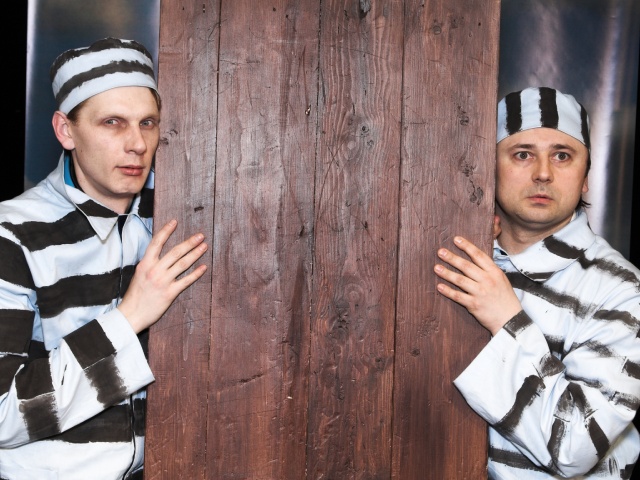Regret having done, claim to have done... (B2)
Verbs with ING or TO (418)
Slovesa s ING nebo TO (5. část)
Na Landigo se dnes zaměříme na použití minulého ingového tvaru (having done) a minulého infinitivu (to have done) po některých slovesech.
Slovesa s ING nebo TO – procvičování:
Další související lekce:
- Slovesa s ING nebo TO (A2)
- Slovesa s ING nebo TO (B1) – 1. část, 2. část
- Slovesa s ING nebo TO (B2) – 3. část, 4. část
Hank claims to have dated the Australian over the summer.
|
He claims to have dated her.
|
|
He claims that he dated her.
|


Pomocí minulého ingového tvaru (having done, having dated...) a minulého infinitivu (to have done, to have dated...) obvykle vyjadřujeme děj, který předchází ději hlavního slovesa (regret, claim...):
- Minulý ingový tvar:
He regrets having done it.
Lituje, že to udělal. He regrets having dated her.Lituje, že s ní chodil. - Minulý infinitiv:
He claims to have done it.
Tvrdí, že to udělal. He claims to have dated her.Tvrdí, že s ní chodil.
He regrets having done = he regrets that he did
Některá slovesa můžeme kromě přítomného ingového tvaru (doing) použít také s minulým tvarem (having done):
|
He regrets doing it.
|
|
He regrets having done it.
|
Minulý ingový tvar se tvoří pomocí HAVING + třetího tvaru slovesa (done, dated, played...):
|
He regrets having done it.
|
Lituje, že to udělal. |
|
He regrets having dated her.
|
Lituje, že s ní chodil. |
|
He regrets having played.
|
Lituje, že hrál. |
Minulý ingový tvar zdůrazňuje ukončení děje a předčasnost, proto se objeví pouze po slovesech, se kterými dává jeho použití smysl, např. REGRET, ADMIT, DENY a MIND:








Např. po SUGGEST a RECOMMEND používáme pouze přítomný ingový tvar (doing):
|
He suggests doing it.
|
Navrhuje to udělat. |
|
He recommends doing it.
|
Doporučuje to udělat. |
Neříkáme: suggest having done, recommend having done
Don't worry. I don't mind having waited for you.
|
I don't mind having waited for you.
|
|
I don't mind that I waited for you.
|


The girls suggest going bowling. How does it sound to you?
| They suggest going... |
| They suggest having gone... |


Regret doing = regret having done
Po REGRET, ADMIT, DENY, FORGET, RECALL a REMEMBER můžeme použít minulý i přítomný ingový tvar (having done/doing) s minimálním významovým rozdílem:
|
He regrets having done it.
|
Lituje, že to udělal. |
|
He regrets doing it.
|
|
|
Does he admit having done it?
|
Přiznává se, že to udělal? |
|
Does he admit doing it?
|
|
|
He denies having done it.
|
Popírá, že by to udělal. |
|
He denies doing it.
|
Pozor, minulý tvar je možné použít pouze s dějem, který je ukončený.








Patrick will never admit having cheated on you. He doesn't want to risk losing you.
|
He won't admit having cheated.
|
|
He won't admit cheating.
|


Misha regrets not having learned languages at school.
|
She regrets not having learned them.
|
|
She regrets not learning them.
|


He claims to have done = he claims that he did
Minulý infinitiv se tvoří pomocí TO HAVE + třetího tvaru slovesa (done, dated, played...):
|
He claims to have done it.
|
Tvrdí, že to udělal. |
|
He claims to have dated her.
|
Tvrdí, že s ní chodil. |
|
He claims to have played soccer.
|
Tvrdí, že hrál fotbal. |
Minulý infinitiv posouvá děj zpátky, tedy před děj hlavního slovesa. Porovnejte s přítomným infinitivem:
| Přítomný infinitiv | Minulý infinitiv |
|---|---|
|
She claims to be the best. (= She claims that she's...)
|
She claims to have been the best. (= She claims that she was...)
|
|
She claimed to be the best. (= She claimed that she was...)
|
She claimed to have been the best. (= She claimed that she had been...)
|
Minulý infinitiv používáme např. po CLAIM, PRETEND, SEEM a APPEAR:








You appear to have put on a lot of muscle since we last saw you.
|
You appear to have put on muscle.
|
|
It appears that you have put on muscle.
|


There was a raccoon in the garden. The poor thing seemed to have injured its paw.
|
It seemed to have injured its paw.
|
|
It seemed that it had injured its paw.
|


I was/meant to have done = měl/chtěl jsem udělat, ale neudělal jsem
Minulý infinitiv někdy vyjadřuje tzv. nereálnou minulost – např. WAS/WERE s minulým infinitivem znamená, že se něco mělo udělat, ale neudělalo se:
|
I was to have done it. (= I should have done it.)
|
|
They were to have helped me. (= They should have helped me.)
|
MEANT s minulým infinitivem znamená, že někdo něco chtěl/zamýšlel udělat, ale nakonec neudělal:
|
I meant to have done it. (= I wanted to do it, but I didn't.)
|
|
They meant to have helped me. (= They intended to help me, but they didn't.)
|
I was to have become a lawyer like my brother. Instead, I decided to teach Italian.
|
I was to have become a lawyer.
|
|
I was supposed to become a lawyer, but I didn't.
|


Roger meant to have travelled with me, but he got sick and had to stay at home.
|
He meant to have travelled.
|
|
He wanted to travel, but he didn't.
|


I'd like to have done = I regret that I didn't do
WOULD + LIKE/LOVE/PREFER + minulý infinitiv použijeme, když jsme něco neudělali, nebo se něco nestalo a my toho teď litujeme:
|
I would like to have talked to you yesterday. (= I regret now that I didn't or couldn't talk to you.)
|
|
I would love to have spent more time with you last year.
|
|
I would prefer to have moved in with you then.
|
WOULD + HATE (NOT) + minulý infinitiv použijeme, když jsme rádi, že se něco (ne)stalo:
|
I would hate to have failed the exam. (= I'm glad that I didn't fail.)
|
|
I would hate not to have been able to see you. (= I'm glad that I was able to see you.)
|
We'd like to have taken more photos. We only have a very few.
|
We'd like to have taken more photos.
|
|
We regret that we didn't take more photos.
|


Sally would love to have played with us. What a shame she couldn't!
|
She'd love to have played.
|
|
She regrets that she couldn't play.
|


I'm glad I made it in time. I'd hate to have missed the train.
|
I'd hate to have missed it.
|
|
I'm glad that I didn't miss it.
|


I believe him to have done = he is believed to have done
Minulý infinitiv používáme se slovesy, která vyjadřují názor nebo znalost, jako např. BELIEVE, KNOW a THINK:
|
I believe him to have done it. (= I believe that he did it.)
|
Věřím, že to udělal. |
|
We know her to have seen it. ( = We know that she saw it.)
|
Víme, že to viděla. |
Minulý infinitiv můžeme použít i po BELIEVE, THINK, KNOW... v trpném rodě. Porovnejte:
| Činný rod | Trpný rod |
|---|---|
|
I believe him to have done it.
|
He is believed to have done it.
|
|
We know her to have seen it.
|
She is known to have seen it.
|
The famous artist is known to have painted over a hundred paintings.
| He is known to have painted... |
| I know him to have painted... |
| He is believed to have made... |
| I believe him to have made... |


Minulý infinitiv můžeme použít se sdělovacími slovesy v trpném rodě jako např. SAY, ALLEGE a REPORT:
|
It is said to have been the largest land animal of all time.
|
Údajně se jednalo o největšího suchozemského živočicha všech dob. |
|
They are alleged to have been working on a secret project.
|
Údajně pracovali na tajném projektu. |
Více o těchto trpných konstrukcích s infinitivem v lekci: He is said to do, it is said that he does...
Two criminals are reported to have escaped from prison last night.
|
They are reported to have escaped.
|
|
It has been reported that they had escaped.
|


Slovesa s ING nebo TO – nejdůležitější body a tip na závěr:
- Minulý ingový tvar → HAVING + třetí tvar slovesa (regret having done, admit having eaten...)
- Minulý infinitiv → TO HAVE + třetí tvar slovesa (claim to have done, pretend to have understood...)
- Děj minulého ingového tvaru/infinitivu předchází ději hlavního slovesa (I regret having done it. = I regret that I did it.).
- Doporučujeme si procvičit slovesa s ING nebo TO (verbs with ING or TO) v našich cvičeních.
